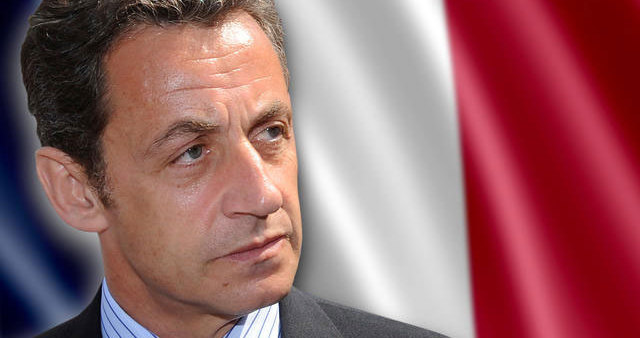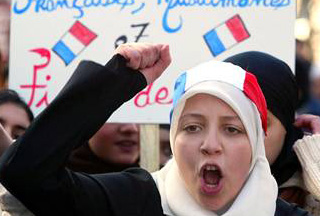Amara Bamba examines the background to the current campaign in France against the veil and draws attention to an online petition against a ban.
Category Archives: France
West must respect the Muslim veil
“Modernity should not be defined solely from a Western, liberal, secular-centred point of view. Our world today is one of multiple modernities, in which societies are increasingly multicultural and religiously and non-religiously pluralistic. Western societies should respect the rights of Muslim women who choose to wear the veil.”
John Esposito in the Gulf Times, 25 June 2009
French secularist defends hijab ban
 “… the burka and all ostentatious religious signs have already been banned in state-run schools since 2004. And in hospitals or municipal offices, anywhere where people interact as equal citizens, staff are not allowed to wear hijabs or burka, and patients or members will be told to unveil.
“… the burka and all ostentatious religious signs have already been banned in state-run schools since 2004. And in hospitals or municipal offices, anywhere where people interact as equal citizens, staff are not allowed to wear hijabs or burka, and patients or members will be told to unveil.
“The ban in schools was passed in 2004 as a reaction to the Socialist Government of Lionel Jospin, which was seen as violating the spirit of the 1905 law on the separation of Church and State. Its laissez-faire attitude allowed a handful of teenagers to start wearing the hijab in school, provoking national outrage and a debate that lasted until the 2004 law finally enforced the Republican principle.
“That such a debate is taking place again reveals the sturdy health of secularism in France, a tradition that doesn’t shy away from being confrontational even in a country with the largest Muslim and Jewish communities in Europe.
“Similar debates seem impossible in Britain. When Jack Straw dared to state the obvious in 2006 by saying that the burka and the niqab were ‘visible statements of separation and of difference’ before asking politely that women visiting his constituency surgery consider removing them, it provoked angry protests from Islamic associations and the British liberal-Left, always inclined, it seems, to defend the rights of liberty’s enemies.
“Seen from France, Britain’s tolerance of extremist views looks at best naive, at worse dangerous…. Seen from Britain, French principles of equality and secularism are often misinterpreted, and dismissed as authoritarian or prejudiced. But critics of the French approach don’t seem to understand that secularism is neutral – the State doesn’t recognise any religion in particular but protects them all, guaranteeing cultural and religious diversity by ensuring that one faith does not get the upper hand.”
Agnès Poirier in the Times, 24 June 2009
Yes, that’s the same French state that is so committed to observing strict neutrality towards all faiths that it banned the Islamic headscarf from schools but ordered flags on all public buildings to be flown at half mast to mark the death of the Pope.
And it’s the same Agnès Poirier who is so committed to the principle of public debate that she rejected an invitation to speak at Ken Livingstone’s “Clash of Civilisations” conference because she would have faced other platform speakers who disagreed with her narrow and dogmatic interpretation of secularism.
MCB statement on Sarkozy’s support for veil ban
Sarkozy Defies Universal Values as he tells Women What Not to Wear: French leader’s Burqa remarks are designed to whip-up further xenophobia against Muslims
The Muslim Council of Britain (MCB) criticised French President Nicholas Sarkozy’s intention to ban the wearing of Burqa – a garment worn by a minority of Muslim women in accordance with their religious belief. Reiterating its long established position that individuals must have the freedom to choose their attire on the basis of deeply-held religious beliefs, the MCB called upon the French President to desist from engaging in and promoting divisive politics towards its Muslim inhabitants. In this respect, the MCB echoes the US President Barack Obama’s caution that “it is important for Western countries to avoid impeding Muslim citizens from practising religion as they see fit – for instance, by dictating what clothes a Muslim woman should wear. We cannot disguise hostility towards any religion behind the pretence of liberalism.”
Assistant Secretary General of the MCB, Dr. Reefat Drabu said: “It is patronising and offensive to suggest that those Muslim women who wear the burqa do so because of pressure or oppression by their male partners or guardians”. She added: “Such suggestions can legitimately be perceived as antagonistic towards Islam. Instead of taking a lead in promoting harmony and social cohesion amongst its people, the French President appears to be initiating a policy which is set to create fear and misunderstanding and may lead to Islamophobic reaction not just in France but in the rest of Europe too”.
MCB press release, 23 June 2009
Update: See also the Daily Telegraph, 24 June 2009
Veil is ‘not welcome on the territory of the French republic’ says Sarkozy
 French President Nicolas Sarkozy has spoken out strongly against the wearing of the burka by Muslim women in France.
French President Nicolas Sarkozy has spoken out strongly against the wearing of the burka by Muslim women in France.
In a major policy speech, he said the burka – a garment covering women from head to toe – reduced them to servitude and undermined their dignity. Mr Sarkozy also gave his backing to the establishment of a parliamentary commission to look at whether to ban the wearing of burkas in public.
“We cannot accept to have in our country women who are prisoners behind netting, cut off from all social life, deprived of identity,” Mr Sarkozy told a special session of parliament in Versailles. “That is not the idea that the French republic has of women’s dignity. The burka is not a sign of religion, it is a sign of subservience. It will not be welcome on the territory of the French republic.”
A group of cross-party lawmakers is already calling for a special inquiry into whether Muslim women who wear the burka is undermining French secularism, the BBC’s Emma Jane Kirby in Paris says. The lawmakers also want to examine whether women who wear the veil are doing so voluntarily or are being forced to cover themselves, our correspondent says.
For Yusuf Smith’s comments see Indigo Jo Blogs, 22 June 2009
Update: See also ENGAGE, 23 June 2009
France: academic freedom under threat
A campaign to safeguard intellectual freedom has been formed in France to support a researcher who faces disciplinary action in connection with his work on Islamophobia.
The IRR reports on the case of Vincent Geisser.
Will France ban the veil?
“Secularism is the religion of contemporary France. And the enforcers of that faith have a new target. ‘Today… we are confronted by certain Muslim women wearing the burqa, which covers and fully envelops the body and the head like a moving prison,’ said Andre Gérin, a Communist Party legislator who joined 57 others Wednesday in signing a motion for a parliamentary committee to study possible legislation to ban the wearing of the traditional costume in public….
“But what about the rights of Muslim women who honestly feel faith-bound to voluntarily don a burka? Or those prohibited by law from attending public school with the headscarfs they wear everywhere else? Why is no one ranting about nuns’ habits being ‘degrading’ (as Gerin called the burqa), just as no one lashed out at creeping extremism when then-First Lady Bernadette Chirac covered her head during Vatican visits?
“Probably because Catholicism has deep roots in French history and culture, and is not viewed as a foreign faith the way Islam is ….”
Bruce Crumley in Time, 19 June 2009
See also “Muslim council slams call for burqa inquiry”, AFP, 18 June 2009
A school ‘condemned to death’
Why are the authorities refusing to fund France’s oldest Muslim school, now facing bankruptcy?
Studying Muslim integration in Europe
Dalia Mogahed draws the lessons from the recent Gallup analysis (pdf) of Muslim integration in France, Germany and the UK.
Update: See also ENGAGE, 21 May 2009
Students protest France anti-hijab law
 Muslim students have held demonstrations in Paris on the fifth anniversary of the banning of the Muslim headscarf in French schools.
Muslim students have held demonstrations in Paris on the fifth anniversary of the banning of the Muslim headscarf in French schools.
The protesters, mostly Muslim girls with hijab, described the “French law on secularity and conspicuous religious symbols in schools” as racial discrimination saying people should be free to choose their dress code.
The law, which is an amendment to the French Code of Education separating state and religious activities, bans students from wearing religious symbols in schools. France’s national legislature passed the controversial bill and President Jacques Chirac signed it into law on March 15, 2004 and it came into effect on September 2, 2004, at the beginning of the new school year.
Many say the bill contradicts court decisions that had allowed students to wear religious signs, as long as they did not amount to “proselytizing”. Although the law does not mention any particular symbol, it is widely believed that it targets Muslims’ headscarves.
